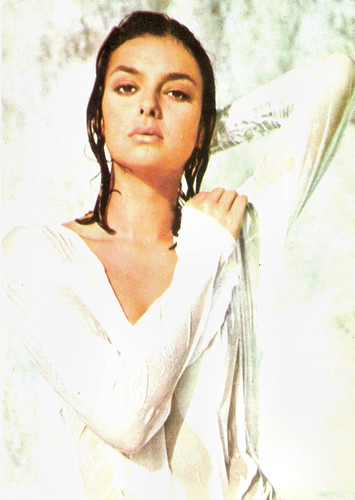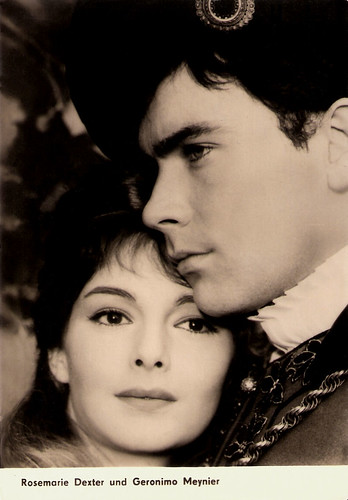Rosemary Dexter (1944-2010) was a British film actress of Pakistani origins, who appeared in dozens of Italian films of the 1960s and 1970s.

Romanian postcard by Casa Filmului Acin.
Rosemary (sometimes Rosemarie) Dexter was born in Quetta, British India (now Pakistan), in 1944. She had a British father and an Anglo-Burmese mother. In the early 1950s, her family moved to Italy. Dexter entered the film industry in 1963.
In Rome, she met director Ugo Gregoretti who offered her the female lead in his science fiction comedy Omicron (1963) starring Renato Salvatori. The following year she played Juliet in the Shakespeare adaptation Giulietta e Romeo/Juliet and Romeo (Riccardo Freda, 1964), which gave the heroine top billing for the first time in history.
In Per qualche dollaro in più/For a Few Dollars More (Sergio Leone, 1964), she played the sister of Colonel Mortimer (Lee Van Cleef) in the flashback scene with Peter Lee Lawrence and Gian Maria Volonté. She appeared in more Spaghetti Westerns, including El desperado/The Dirty Outlaws (Franco Rossetti, 1967).
Other films were Desideri d'estate/Summer Wish (Silvio Amadio, 1964) with Gabriele Ferzetti, Oltraggio al pudore/All the Other Girls Do! (Silvio Amadio, 1964), and Un uomo a metà/Almost a Man (Vittorio Seta, 1966) starring Jacques Perrin.
Robert Firsching at AllMovie about the latter: “The strong supporting cast, including Lea Padovani and Pier Paolo Capponi, bring credence to their roles, but it is De Seta's direction, Perrin's controlled performance, and a relatively subtle score by Ennio Morricone which keep this film from becoming as overwrought as it might have become in other hands.”

East-German postcard by VEB Progress Filmvertrieb, Berlin, no. 2923, 1967. Photo: publicity still for Giulietta e Romeo/Juliet and Romeo (Riccardo Freda, 1964).
Rosemary Dexter was a very active film actress until the mid-1970s. She acted in international productions such as The Shoes of the Fisherman (Michael Anderson, 1968) starring Anthony Quinn, thanks to her knowledge of languages. However, she was no longer able to get scripts that matched her acting talents.

Romanian postcard by Casa Filmului Acin.
For a Few Dollars More
Rosemary (sometimes Rosemarie) Dexter was born in Quetta, British India (now Pakistan), in 1944. She had a British father and an Anglo-Burmese mother. In the early 1950s, her family moved to Italy. Dexter entered the film industry in 1963.
In Rome, she met director Ugo Gregoretti who offered her the female lead in his science fiction comedy Omicron (1963) starring Renato Salvatori. The following year she played Juliet in the Shakespeare adaptation Giulietta e Romeo/Juliet and Romeo (Riccardo Freda, 1964), which gave the heroine top billing for the first time in history.
In Per qualche dollaro in più/For a Few Dollars More (Sergio Leone, 1964), she played the sister of Colonel Mortimer (Lee Van Cleef) in the flashback scene with Peter Lee Lawrence and Gian Maria Volonté. She appeared in more Spaghetti Westerns, including El desperado/The Dirty Outlaws (Franco Rossetti, 1967).
Other films were Desideri d'estate/Summer Wish (Silvio Amadio, 1964) with Gabriele Ferzetti, Oltraggio al pudore/All the Other Girls Do! (Silvio Amadio, 1964), and Un uomo a metà/Almost a Man (Vittorio Seta, 1966) starring Jacques Perrin.
Robert Firsching at AllMovie about the latter: “The strong supporting cast, including Lea Padovani and Pier Paolo Capponi, bring credence to their roles, but it is De Seta's direction, Perrin's controlled performance, and a relatively subtle score by Ennio Morricone which keep this film from becoming as overwrought as it might have become in other hands.”

East-German postcard by VEB Progress Filmvertrieb, Berlin, no. 2923, 1967. Photo: publicity still for Giulietta e Romeo/Juliet and Romeo (Riccardo Freda, 1964).
Beautiful eye candy
Rosemary Dexter was a very active film actress until the mid-1970s. She acted in international productions such as The Shoes of the Fisherman (Michael Anderson, 1968) starring Anthony Quinn, thanks to her knowledge of languages. However, she was no longer able to get scripts that matched her acting talents.
On TV she guest-starred in Vendetta for the Saint (James P. O'Connolly, 1968), an episode of the popular spy series The Saint, featuring Roger Moore. She often played the love interest of the hero or the beautiful eye candy.
Later films include the Easy Rider rip-off Cometogether (Tony Anthony, Saul Swimmer, 1971) with Luciana Paluzzi, the Giallo L'Occhio Nel Labirinto/Eye of The Labyrinth (Mario Caiano, 1971) with Adolfo Celi, and the comedy Mio Dio, come sono caduta in basso!/How Long Can You Fall? (Luigi Comencini, 1974) starring Laura Antonelli.
In 1975, after a photo shoot for the Italian Playboy, she retired from acting, at only 32. Her final film was the fantasy Povero Cristo/Poor Christ (Pier Carpi, 1976) with Edmund Purdom. She went to live in the Villa Leopardi in Recanati on the recommendation of Count Vanni and his family with whom Dexter was a long-time friend.
In 2010, Rosemary Dexter was found dead in her house in Recanati. She had been suffering from a long illness. Her death was traced back to two or three days before she was found. Dexter had no relatives and expressed her wish to be cremated after she died.
Sources: Robert Firsching (AllMovie), Matt Blake (The Wild Eye), Tom B. (Boot Hill - now defunct), Wikipedia (English and German) and IMDb.
This post was last updated on 3 January 2024.
Rosemary Dexter was director Jess Franco's first choice for the title role of his 1969 adaptation of the Marquis de Sade's Justine. Unfortunately the producers insisted that Romina Power, the daughter of Tyrone Power, was cast as Justine so Franco had to give Ms. Dexter a much smaller role in the movie. He always claimed that the movie would have been much stronger with Rosemary Dexter in the lead.
ReplyDeleteThanks. Interesting.
ReplyDeleteRest in peace Angel.😇 🙏🥂🍾
ReplyDelete